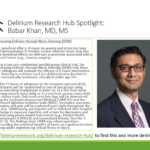NIDUS Blog
Postoperative Delirium and Biomarkers of Alzheimer’s Disease: What We Know and What We Need to Know
Contributed by Dr. Sophia Wang, MD, MS, Assistant Professor of Clinical Psychiatry, Indiana University School of Medicine Postoperative delirium affects 15-50% of older adults undergoing major surgery.1 The literature strongly supports a bidirectional relationship between delirium and dementia.2 While both delirium and dementia affect cognition, they are quite different in their clinical presentations. Delirium is […]
Investigator of the Month (January 2023): Kirsten Fiest, PhD
Dr. Kirsten Fiest is an Associate Professor of Critical Care Medicine, Community Health Sciences & Psychiatry at the University of Calgary. She is also Director of Research and Innovation in the Department of Critical Care Medicine. Dr. Fiest received her PhD in Epidemiology from the University of Calgary and completed post-doctoral training in neuro and […]
Association between Symptom Domains of Delirium and Outcomes in Hospitalised Adults
Contributed by Zoë Tieges, PhD, Psychology Research Fellow, Geriatric Medicine, Usher Institute, The University of Edinburgh, Edinburgh, UK Research question: do patients with delirium experience poorer outcomes when they have certain symptoms? Delirium is a syndrome with a wide spectrum of clinical presentations. According to DSM-5 (and the recent DSM-5 Text Revision) criteria, the key […]
Delirium Research Hub Spotlight – Babar Khan, MD, MS
Every few months, the Delirium Research Hub features an investigator and research study from the Delirium Research Hub. This month’s Spotlight Investigator is Dr. Babar Khan. We feature his study, the Decreasing Delirium through Music listening (DDM) trial.
Investigator of the Month (December 2022): Michele Cavallari, MD, PhD
Michele Cavallari is an Assistant Professor of Radiology at Harvard Medical School. Dr. Cavallari graduated cum laude in Medicine in 2005, then completed a residency in Neurology at the Sapienza University Hospital Sant’Andrea (Rome, Italy) and a PhD program in Clinical and Experimental Neuroscience and Psychiatry. Dr. Cavallari’s research aims at exploring neurological conditions through […]
The Posterior Dominant Rhythm: A Proof-of-Principle Study Whether it is an Electroencephalographic Biomarker for Tracking Delirium Onset and Recovery
Contributed by Ben Julian A. Palanca, MD, PhD, MSc, Associate Professor of Anesthesiology, Associate Professor of Psychiatry, Washington University School of Medicine in St. Louis; Affiliated Faculty, Department of Biomedical Engineering, Washington University; Director, Sleepy Brain Lab Predictive biomarkers for prognosticating delirium onset and severity are needed for targeting interventions that may prevent delirium onset. […]
Investigator of the Month (November 2022): Patricia A. Tabloski, PhD, GNP-BC, FGSA, FAAN
Patricia A. Tabloski, Ph.D., GNP-BC, FGSA, FAAN is an associate professor at the Connell School of Nursing. Dr. Tabloski’s work focuses on the epidemiology and treatment of various threats to quality of life and function in older adults. This work has involved elucidating risk factors for poor outcomes, the development and testing of non-pharmacologic interventions […]
Selective Serotonin Reuptake Inhibitor (SSRI) Use and Delirium Occurrence in the ICU
Contributed by C. Adrian Austin, MD, MSCR, Divisions of Geriatric Medicine and Pulmonary Diseases and Critical Care Medicine, University of North Carolina School of Medicine, Chapel Hill, NC Anxiety, depression and ICU delirium may be linked.1 Approximately 10% of the U.S. population takes an antidepressant, most commonly a selective serotonin reuptake inhibitor (SSRI).2 It remains […]
Tags
Blog Topics
- Announcements & News (81)
- Delirium Research (73)
- AD/ADRD (10)
- Investigator of the Month & Spotlights (33)
- NIDUS Resources (8)
Citing a published NIDUS blog post on your CV
When citing a NIDUS blog post on your CV, list it in a section entitled ‘Other Non-Peer Reviewed Scholarship’. For the actual citation, list your name, blog title, organization (NIDUS), and the link to Blog. At the end, add ‘invited blog’ in brackets. This is the format suggested on the Harvard Med School CV template.
Example:
Sam Jones, My Delirium Blog Post, NIDUS, www.deliriumnetwork/my-delirium-blog-post.org (invited blog)







